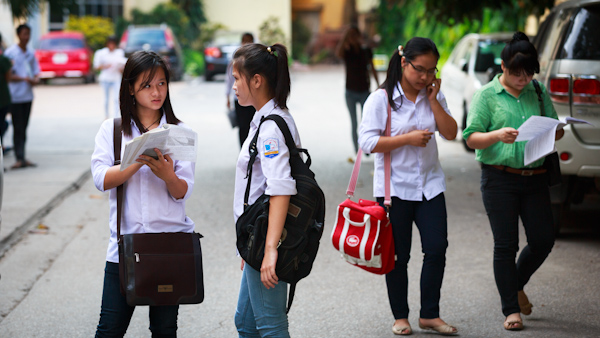
On the afternoon of July 9th, 3,892 candidates took the History exam. At exam centers AB, BC, and G of the University of Social Sciences and Humanities' admissions council, reporters witnessed many candidates leaving early before the exam time was over. When questioned, the candidates all assessed the exam questions as clear, easy to understand, and containing much basic knowledge, but many candidates were unable to complete the entire exam.Of the four questions in the exam, the first and third were considered not difficult because they were clear and asked about basic knowledge from the curriculum. However, the second and fourth questions were the most challenging and confusing for candidates. Candidate Nguyen Thanh Tuan (taking the Law exam) commented: "This year's exam was easier than last year because the questions about Vietnamese history were easy to understand and clear, not tricky or misleading. I was a little surprised by question 4 about world history because since 2006, the separate question section has followed the principle: if it asks about Vietnamese history this year, it will ask about world history next year. Since last year's separate section already asked about world history, I and many other students didn't expect the exam to ask about world history again this year. Regarding the question about dividing historical periods, I divided it into six periods: 1919-1929; 1930-1931; 1936-1939; 1939-1945; 1945-1954; 1954-1975. Candidate Nguyen Thi Thu (taking the Oriental Studies exam) said: "The exam questions were focused on the topics I studied and reviewed, but because I didn't study thoroughly enough, I couldn't answer the questions about world history."

Candidate Nguyen Van Tuan (taking the Sociology exam) also admitted that he only managed to complete 50% of the exam, even though the questions were all based on basic knowledge, the content was too broad for him to review completely. Regarding question 2, Tuan shared: “This was a very difficult question, not in the exam syllabus. I had never encountered this type of question before, and I didn't understand what criteria the question required to divide the period. The question about Japan's foreign policy wasn't on my radar because my focus in world history was only on the economics of European countries.” Similarly, candidate Ngo Thi Thu Thao (taking the Vietnamese Studies exam) felt that the exam covered basic knowledge but was a bit long. Question 2 was the most difficult and comprehensive because it required a summary of the history of the Vietnamese revolution into different periods. The other questions focused on specific content within a text and only required presentation, making them simpler. Comparing it to previous years' exams, candidate Pham Quang Tuan (taking the Journalism and Communication major) said: "The History exam was more difficult than previous years in terms of the requirement to divide historical periods. The way the question was phrased confused me; I couldn't determine if it was about the Dien Bien Phu campaign or something else. In the end, I presented the course of the campaign. Regarding the periods, I divided it into over 10 stages, according to the textbook, such as: 1919-1925; 1925-1930; 1930-1945; 1954-1975... As for the question about Japan's foreign policy, according to Pham Quang Tuan, few candidates thought about it because the focus of the teachers' preparation in the world history section was on the Soviet Union and the United States."
Author:thanhha
Newer news
Older news